Why I Play: Tay Wei Ming, para badminton
"Why I Play” is a weekly column every Wednesday showcasing the stories of people who enjoy playing sports in Singapore. Want to see your sport featured? Let us know via Facebook, Twitter or email.
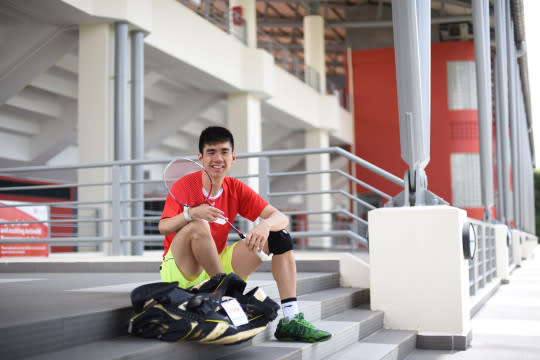
Tay Wei Ming is a full time national Para Badminton player. He has won one silver and two gold medals in previous ASEAN Para Games and has clinched the bronze medal in the 2013 Para Badminton World Championships.
How did you get involved in this sport?
I picked up badminton at the age of 10 that was in primary four. How I got started was because of my father, he was a very sporty guy so I inherited his sports genes.
We will have this weekly routine whereby during the weekends, after dinner, we will play a sport together. Near my house, there’s a badminton court so we will play together with my mom and dad.
As time progresses, I developed a larger passion for badminton. The reason is because a lot of sports require they require both hands. For example, like tennis you need to throw the ball up then you serve and with my disability I cannot do that.
But I find badminton is a sport where I can progress further and I was thinking if I practice this sport why not achieve something out of it because I am the kind of person who takes pride in whatever I do. My badminton career path started from there.
What kind of a workout do you get from playing this sport?
In general, it works all parts of the bodies but I think the most taxing part would be the legs. This is because for people with disability, they tend to have slow rotation movement. For me, my disability is for my right arm so my rotation part will be slower because you need both hands to be balanced.
The balance on my right side would be weaker so the rotation will be slower and as a result I rely a lot on my waist muscles and legs. The legs are very important because it’s the only body part that allows you to move around the court.
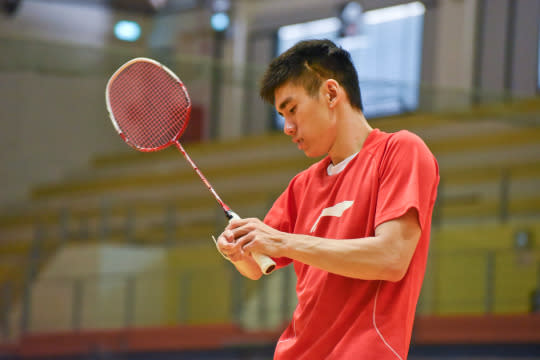
Biggest misconceptions people have of this sport?
Most of the general public, they might not know about para badminton in a sense that they might not know that there is such a thing as wheelchair badminton. Some of them don’t even know that for the para badminton athletes, the competition scoring system is the same for able bodied.
Some might not even know that there’s a para badminton team in Singapore.
In playing this sport, what’s been your most memorable experience? Your most heartbreaking?
I would say in World Championships in 2013, which is in Dortmund, Germany. For Para badminton right now, the highest level for competition is the World Championships because currently we are not in the Paralympics yet, so the highest level is World Championships. So during that Para Badminton World Championships, I managed a bronze.
It was quite an achievement, I mean come on, it’s World’s Championships. It’s everybody’s dream to take part in it.
The most heartbreaking would be the recent ASEAN Para Games in Singapore – competing on home ground and not obtaining a medal. I played in the quarter-final and I lost by two points. If I managed to get into the semi-finals, I can at least get a bronze.
I think that was heartbreaking. Especially since it’s home ground not knowing how many years later before you have another ASEAN Para Games in Singapore again.
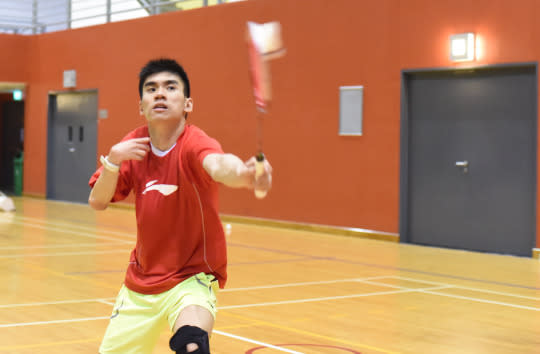
Share an inspiring story you have of a tournament or an experience with team mates that made you love this sport even more.
The first inspiring factor is my family because being the only single child, in the future I will be the sole breadwinner. I wanted to have a name for myself in para badminton and I hope that para badminton can help me to sustain a living in the future.
My parents have given me great moral support and they have never asked me to stop badminton from secondary school onwards until now. They have never stopped me from buying rackets and they have always supported me monetarily and morally and they know that sports is something that could give me a direction in life.
So my family members are a huge inspiration for me and now they are getting old so I know that it’s time for me to give back to them.
Second factor is my fellow para athletes. All along I have a belief that nowadays youngsters idolise Korean bands or Kpop. Come on man, I mean, your parents are the ones who brought you up. I think you should idolise your parents more than those bands.
And our fellow para athletes, they themselves have to break through their disabilities and then they have to train very hard for their individual sports as well.
Honestly speaking, I see myself, my disability as not very major, not very serious. There are people who are way worse off than me and their fighting spirit, you can see them fighting very hard on the court during competitions. Seeing them fighting so hard inspires me to train even harder.
Was there a time you felt like walking away from the sport? What made you stay?
It was a period of time when I was going to graduate from Nanyang polytechnic. So after you graduate with diploma you either continue studies or going to work. During that time I had the dilemma whether I should continue to pursue my passion full time.
Fortunately, I applied for the SPEX scholarship by Sport Singapore and I manage to get in and it came in time for me so I could continue to pursue (Para Badminton) full time. SPEX scholarship gave me the allowance to carry on.
Secondly, the support in sports is getting better but it’s still not enough. At the recent ASEAN Para Games, there was a lot of publicity and quite a number of sponsors came forward to help us.
With this SPEX scholarship, I told myself that I give myself another four to five years to pursue sports full time. My ultimate goal is to represent Singapore in the 2020 Paralympics, which will be the first time that Para badminton is included, so I must persevere to that stage.
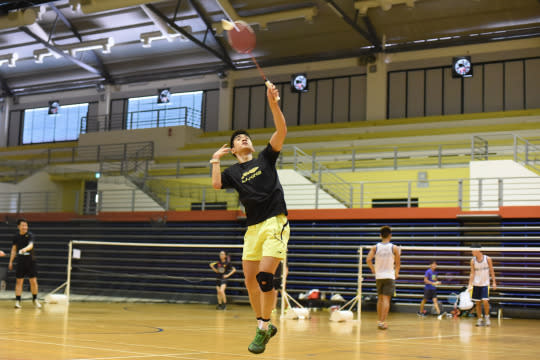
What life lessons has this sport taught you?
A person with disabilities tends to have low self confidence so sports is the factor that made me a more confident person. This is because when you practice the sport, you tend to interact with more people.
When you reach a certain level you get to take part and compete for your schools, you get to have your own badminton team and school team. There are a lot of interactions when you practice sports, leisurely and at competitive levels. It broadens my network of friends.
Secondly, badminton taught me that nothing is easy in life. Every accomplishment that you want to achieve you need to put in a lot of dedication and hardwork. You want to become the best you must be able to tahan hardship
Thirdly, badminton taught me how to plan for my future. In the beginning you only think of playing leisurely to competing, to helping your schools to compete, to taking up coaching as part time job and finally to make badminton as a career.
Lastly, badminton taught me to give back to society. Along the way, I was quite fortunate to get a lot of help, be it coaches, sports associations, schools, polytechnic. When you receive help from them, in the future when you have accomplishments, you really must thank them and give back to society and do some community work for the disabled and stuff.
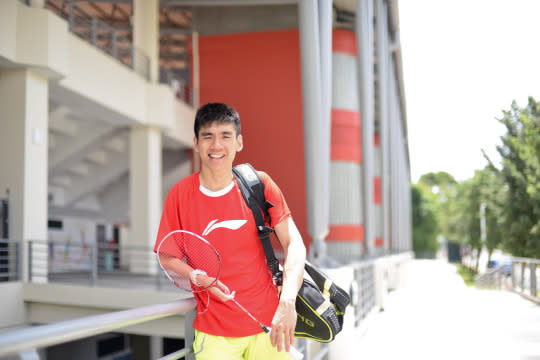
How can people get involved if they’re interested in this sport?
The Singapore Disability Sports Council (SDSC) have a “learn to play” programme catered to various special schools. Not all people with disabilities are enrolled in special schools, some of them go to mainstream schools.
When you think of para sports, the person can look for SDSC but for people with disabilities studying in mainstream schools, it’s a bit difficult for them because they won’t have the “learn to play” programme.
There is no proper system to build the foundation for para badminton yet. There is one in special schools but not in the mainstream schools. I think the only way is that those interested can come to SDSC or touch base with one of the special schools.
My sport is unique because... it enables a person and empowers them with qualities that he or she has never achieved before.

